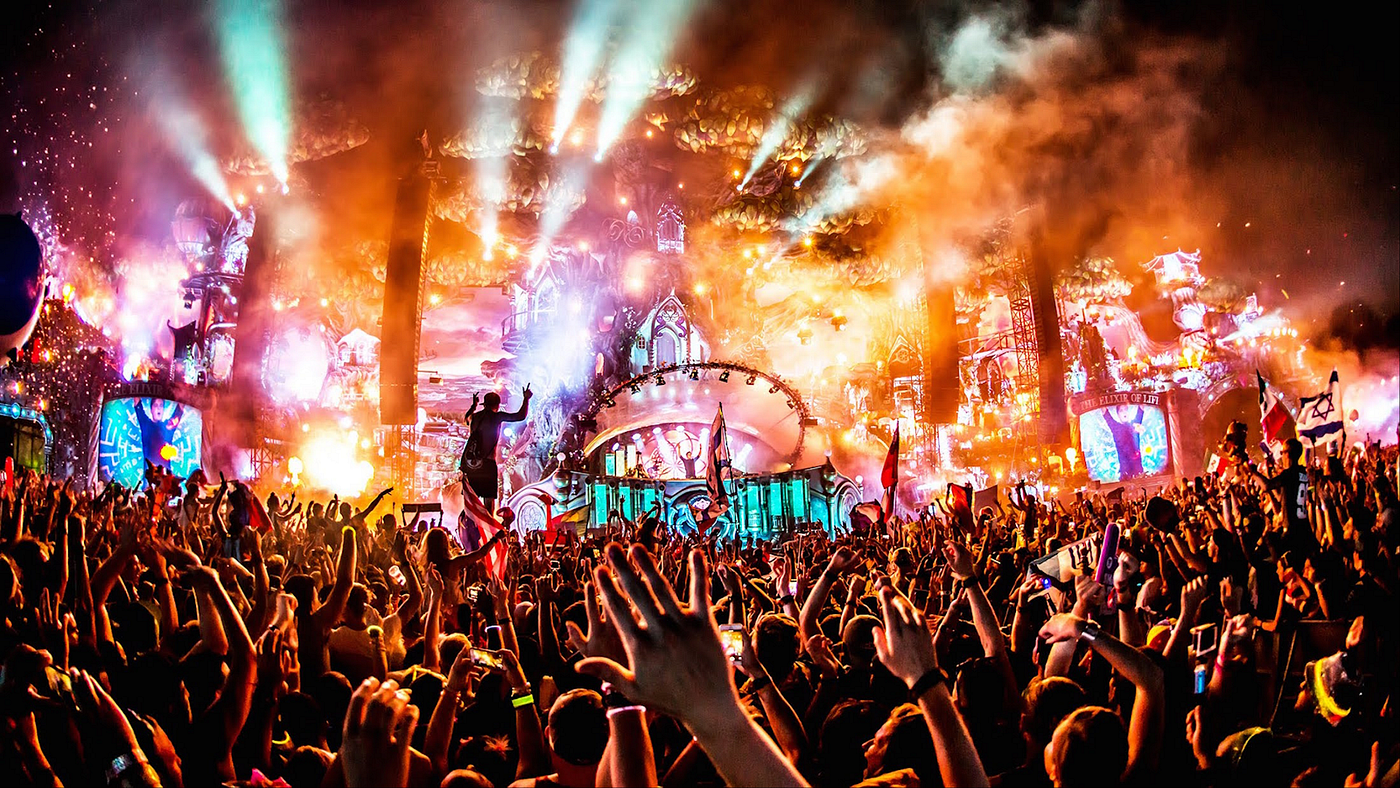Introduction
The live music industry has experienced a major transformation over the years, thanks to rapid technological advancements. From enhancing fan engagement to making concerts more accessible and immersive, technology is playing a pivotal role in reshaping the concert experience. In this article, we’ll explore six key technology trends that are redefining live music and elevating it to new heights.
The Rise of Technology in Live Music
In recent years, technology has completely transformed the live music industry. Concerts are no longer just about attending a physical event. With new tools like virtual reality (VR), live streaming, and mobile apps, concerts have become more interactive and accessible. These advancements allow fans to enjoy live music experiences from anywhere in the world. As technology continues to evolve, it is playing an even bigger role in shaping the future of live performances.
Benefits of Technology in Live Music
Technology has brought many benefits to the live music experience. Fans can now watch concerts from their homes through live streaming or VR, making live shows more accessible to everyone, regardless of location. Mobile apps and wearable technology make it easier for fans to engage with the performance, purchase tickets, and interact with other concert-goers. Additionally, advanced technologies like AI and blockchain have improved ticketing, making it more secure and personalized. Overall, technology enhances the concert experience for both fans and artists.
Concert Industry Technology Trends
1. Virtual Reality (VR) and Augmented Reality (AR) Concerts
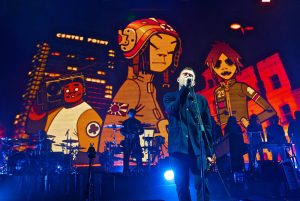
Bringing Live Music to Your Home One of the most significant changes in the concert industry is the rise of virtual reality (VR) and augmented reality (AR). With VR, fans can now experience concerts from the comfort of their own homes. Artists and event organizers are using VR platforms to stream live performances, allowing fans to feel as though they are physically present at the venue. AR, on the other hand, enhances live shows by overlaying digital elements like graphics or lyrics onto the real world, creating an interactive and dynamic experience.
Enhancing Audience Interaction Both VR and AR offer opportunities for fans to interact with the performance in real time. From virtual meet-and-greets to interactive merchandise stands, these technologies help build a deeper connection between the artist and the audience. As technology continues to evolve, VR and AR are set to become essential tools in the live music landscape.
2. Live Streaming and Hybrid Concerts

Global Accessibility Live streaming has grown exponentially, allowing fans worldwide to enjoy concerts that were once restricted to physical attendance. Artists are now performing in hybrid concerts, where a live audience attends in person while others watch remotely via streaming platforms. This trend has opened up concerts to a global audience, increasing accessibility and removing geographical barriers.
Monetizing Streaming Concerts Live streaming concerts also present new revenue opportunities. Fans can purchase digital tickets for exclusive online access, participate in virtual VIP experiences, or even buy merchandise in real-time during the performance. This hybrid model has transformed live music into an inclusive, worldwide event.
3. Artificial Intelligence (AI) for Personalized Concert Experiences
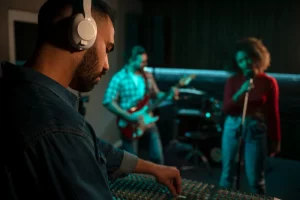
AI-Driven Playlists and Recommendations Artificial intelligence is revolutionizing how fans experience live music. AI algorithms analyze data from social media, streaming services, and user preferences to create personalized concert playlists or recommend upcoming shows based on individual music tastes. This technology ensures that fans receive tailored concert suggestions, creating a more personalized experience.
Enhancing Artist-Fan Interaction AI is also being used by artists to improve fan engagement. From chatbots that handle ticket queries to AI-generated content such as personalized shoutouts or song dedications, this technology makes the concert experience feel more intimate. Artists can better understand their audience and tailor their performances accordingly, strengthening the bond between performer and fan.
4. Blockchain for Ticketing and Anti-Scalping Solutions
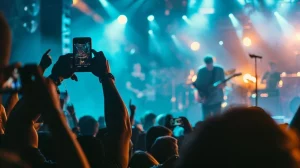
Secure and Transparent Ticketing Blockchain technology is making waves in the ticketing industry by offering a secure and transparent way to buy concert tickets. Blockchain allows for tickets to be authenticated, preventing counterfeiting and resale fraud. This technology also enables artists and promoters to keep better control over ticket prices, helping to curb the issues of ticket scalping and inflated secondary market prices.
Eliminating Scalping and Fraud With blockchain-based ticketing, fans can rest assured that the tickets they purchase are genuine. Each ticket is linked to a secure digital ledger, making it traceable and ensuring it cannot be resold at an unfair price. This shift is revolutionizing how concerts handle ticket sales, providing peace of mind for both artists and fans.
5. 5G Technology for Seamless Concert Experiences
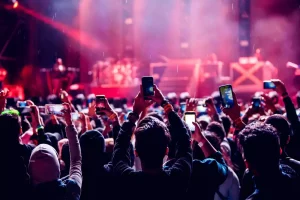
Faster Connections and Real-Time Streaming The rollout of 5G technology is significantly improving the concert-going experience. With faster internet speeds, fans at live events can stream the performance in real-time, share their experiences on social media, and interact with apps or services that enhance the show. 5G also makes it easier to implement advanced technologies like VR and AR during concerts, ensuring a seamless and immersive experience.
Elevating the Concert Environment For concert organizers, 5G allows for more complex stage setups, better crowd management, and real-time monitoring of event logistics. This technology enhances the overall concert experience for both performers and fans, providing greater reliability and connectivity in high-density environments.
6. Sustainability Through Green Technology
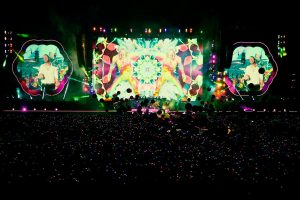
Eco-Friendly Concerts With increasing concerns about environmental impact, the live music industry is adopting green technologies to reduce its carbon footprint. From solar-powered stages to LED lighting, concert organizers are prioritizing sustainability. Many events now use eco-friendly transportation, recycle stage materials, and encourage fans to engage in waste reduction efforts.
Fans Demand Sustainability More and more, fans are looking to attend concerts that align with their environmental values. Technology is enabling concert organizers to make greener choices, which not only benefits the planet but also resonates with eco-conscious audiences. This trend is likely to grow, making sustainability a core component of future live music experiences.
Hologram Performances for Iconic Artists
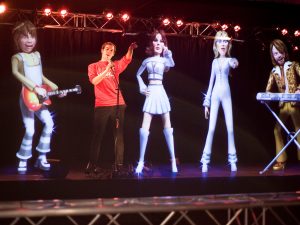
Bringing Legends Back to the Stage Hologram technology has made it possible for legendary artists who have passed away to “perform” live on stage again. These digital representations are created with advanced visuals and audio, allowing fans to see and hear their favorite artists as if they were still performing.
A Unique Experience Hologram performances offer a completely new type of concert experience. Whether it’s a solo hologram performance or a duet with a living artist, this technology creates unforgettable moments for fans. As the technology improves, we may see even more holograms of iconic artists on tour.
Drones for Capturing Concerts from New Angles
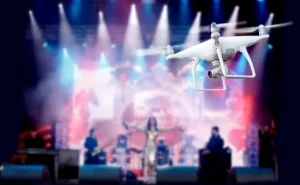
A New Way to View Concerts Drones are being used more frequently to capture live concerts from unique angles. These flying cameras provide aerial views of the stage and crowd, creating stunning video footage that can be streamed or shared online. Drones offer fans a new perspective that enhances the visual experience.
Improving Security at Events In addition to creating great visuals, drones are also helping to improve security at large events. They can monitor crowds, identify potential issues, and ensure the safety of both fans and performers. This makes concerts safer and more organized.
Challenges of Using Technology in Live Music
While technology has greatly improved live music, it also comes with challenges. Not everyone has access to the advanced equipment needed for VR concerts, and some fans may feel that digital experiences lack the energy of attending a live show in person. There are also concerns about security and privacy, especially when using new payment systems or blockchain ticketing. Artists and organizers must balance these challenges while keeping the fan experience enjoyable and safe.
The Future of Technology in Live Music
The future of live music looks bright, with more technology-driven experiences on the horizon. As VR, augmented reality (AR), and AI continue to develop, concerts will become even more immersive and personalized. We may see more hybrid concerts, where live audiences attend in person while others stream the event online. Hologram performances could bring iconic artists back to the stage, creating unique experiences for fans. With sustainability efforts also gaining attention, future concerts may rely on eco-friendly technology to reduce their environmental impact. Technology will continue to redefine how we enjoy live music.
Analysis Table: Impact of Technology Trends on Live Music
| Technology Trend | Impact on Industry | Key Benefits for Fans | Key Benefits for Artists/Promoters |
|---|---|---|---|
| VR and AR | Redefines the concert experience | Immersive, at-home concert access | New engagement opportunities |
| Live Streaming & Hybrid | Expands global accessibility | No geographical barriers | Increased revenue streams |
| AI Personalization | Enhances audience interaction | Tailored concert recommendations | Deeper fan engagement |
| Blockchain Ticketing | Prevents ticket fraud and scalping | Secure and transparent transactions | Greater control over ticket pricing |
| 5G Technology | Enables seamless and real-time connectivity | Faster and better concert experience | Improved event management and logistics |
| Green Technology | Reduces environmental impact | Attending eco-friendly concerts | Meeting sustainability demands |
Comparative Table: Traditional vs. Tech-Enhanced Concerts
| Aspect | Traditional Concerts | Tech-Enhanced Concerts |
|---|---|---|
| Accessibility | Limited by physical attendance | Global access through live streaming and VR |
| Interaction | Mostly passive, in-person engagement | Real-time interaction with digital elements |
| Ticketing | Prone to scalping and fraud | Blockchain ensures transparency and security |
| Connectivity | Limited by internet speeds and infrastructure | Enhanced by 5G for smoother experiences |
| Sustainability | Limited eco-conscious efforts | Green technology reducing environmental impact |
Conclusion
The integration of new technologies is transforming the live music industry in ways never seen before. From virtual concerts to blockchain ticketing, these innovations are enhancing the experience for both fans and artists. As technology continues to evolve, it will be fascinating to see how the concert industry adapts to these changes, creating more immersive, accessible, and sustainable music experiences.

